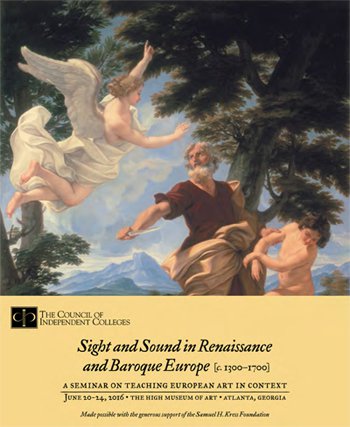Sight and Sound in Renaissance and Baroque Europe
Members of Art and Music Histories faculty to lead seminar in Atlanta

Gary Radke, professor emeritus of art history, and Amanda Winkler, associate professor of music history and cultures, are set to lead a weeklong teaching seminar in Atlanta this month, focusing on the music and art created in Europe during the Renaissance and Baroque eras.
Their colloquium, titled “Sight and Sound in Renaissance and Baroque Europe,” will take place June 20–24 at the famed High Museum of Art and is part of the Council of Independent Colleges’ (CIC) Teaching European Art in Context seminar series. The conference is specially designed for non-specialists in the period and for faculty members at CIC institutions without large campus museums or proximity to major art museums.

Chosen for their diverse interdisciplinary backgrounds, 21 art history, studio arts, history, English literature, and music faculty members from around the country have been competitively chosen to take part in the summer seminar, which will focus on learning to listen to music and view art as people in Europe did during the Renaissance and Baroque periods (c. 1300–1700). Participants will also explore basic stylistic developments in European painting and music, while examining the wide variety of roles these arts played in religious and secular life.
Radke is considered one of the world’s leading experts on Italian Medieval and Renaissance art and architecture, with a special interest in 15th-century Florentine sculpture. He has also served as a guest curator at Atlanta’s High Museum of Art, where he organized a series of high-profile shows—featuring works by Leonardo, Michelangelo, Ghiberti, Verrocchio, and other Italian Renaissance masters. A fellow of the American Academy in Rome, Radke has been honored numerous times, including being named the Meredith Professor for Teaching Excellence and William Wasserstrom Awardee for Excellence in Graduate Teaching.
Winkler is director of undergraduate studies in the department of art and music histories (AMH). Her research primarily focuses on English theater music from the 16th century to the present day and she has published books, essays, and articles on topics ranging from didactic masques in the 17th century to Andrew Lloyd Webber’s “The Phantom of the Opera.” Winkler’s current projects include a study of music, theater and dance in early modern English schools, and a collection of essays, co-edited with Linda Austern and Candace Bailey, on the circulation of music in early modern England, which will be published by Indiana University Press in 2017.
The Council of Independent Colleges’ (CIC) Teaching European Art in Context seminar series is supported by the Samuel H. Kress Foundation
